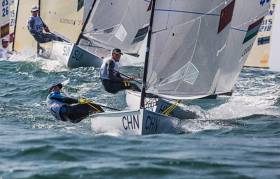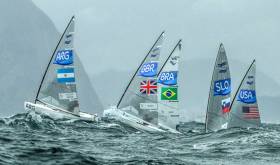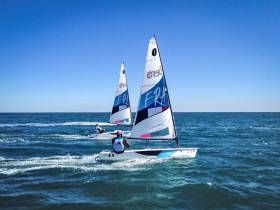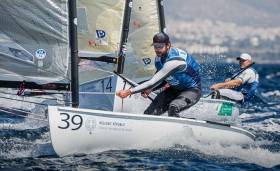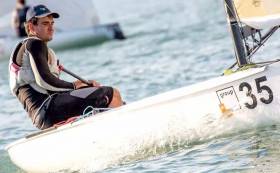Displaying items by tag: Paris 2024
Finn Class Makes Eight Submissions To World Sailing Conference To ‘Rebalance The Slate’ In Olympics
The Finn class has made eight submissions to the upcoming World Sailing annual conference in Bermuda in its efforts to ‘rebalance the slate’ of Olympic sailing.
This past summer the one-person dinghy class — which at least year’s conference was removed from the Paris 2024 Games onwards in favour of a mixed two-person keelboat event — suggested a number of ways in which sailing’s world governing body could close the gaps of opportunity for men over 85kg and lightweight women.
These include cutting the number of board events from three (which it says “is not representative of sailing as a sport globally”) to two, or replacing the mixed kite with the Finn. The class does not propose any conflict with the newly introduced mixed keelboat.
The proposals form the basis of the Finn class’ eight submissions, which are available on the World Sailing website and will be reviewed and discussed at the conference which begins this Saturday 26 October.
The Finn class has announced proposals to ‘rebalance the slate’ of Olympic sailing as it identifies a lack of opportunity for heavyweight men and lightweight women.
The mixed one-person dinghy class, which late last year was removed from the Games from 2024 onwards in favour of a two-person keelboat, says the decision now leaves men over 85kg with no chance of sailing at the Olympics.
But it also identified a gap for lightweight women whose opportunities have also been limited, it says.
The International Finn Association now says it is “working on a series of submissions for November to rebalance the Olympic events, providing options for both heavyweight men and lightweight women”.
It is being suggested that kiteboarding becomes a men’s event match by a windsurfing event for women, while the mixed two-person dinghy becomes a women’s event alongside a reintroduced one-person dinghy for heavyweight men.
“It will be a balanced slate that allows for the widest possible spread of participation across genders, weights and nations within the constraints laid down by the IOC,” the class says.
These proposals will form the substance of its submissions to World Sailing for the governing body’s November conference in Bermuda.
And the class is appealing for responses from interested parties to get involved at [email protected] “to help us build a better balanced and more representative slate of Olympic events for 2024”.
RS Sailing says it respects the World Sailing council vote to retain the Laser as the Men’s and Women’s One Person Dinghy event for the 2024 Olympic Games in Paris — while also hailing the RS Aero’s superior evaluation.
As reported yesterday on Afloat.ie, sailing’s world governing body voted in a secret ballot on the last day of its Mid-Year Meeting on Sunday 19 May to retain the Laser and Laser Radial.
This was despite the upstart RS Aero outscoring the incumbent — which faces a name change amid a dispute between the class association and its former leading manufacturer — by more than 10% in a detailed evaluation and sea trials conducted this past March.
Reflecting on the decision taken in London on Sunday, RS Sailing said it “would like to sincerely thank World Sailing for giving the RS Aero the opportunity to be part of the 2024 Equipment Selection for the Men’s and Women’s One Person Dinghy.
“We were impressed throughout the whole process by the Evaluation Team, World Sailing staff and the Equipment Committee who did a very professional and impressive job. We were extremely confident in the depth and thoroughness of the Evaluation Panel to conduct a fair and complete evaluation process.
“RS Sailing also sends a heartfelt thank you to all our followers and sailors, old and new, and have been completely overwhelmed by the global support for the RS Aero and RS Sailing. You’ve all genuinely been on this journey with us and it feels like we’ve made a whole load of new friends in the process.”
The UK company said it was “undeniable that the RS Aero has been proven superior in almost every aspect” and cited comments from Dina Kowalyshyn, chair of the World Sailing Equipment Committee, who noted the boat’s light hull and size (which “make it attractive and suitable for the youth pathway”), its “modern materials and modern production methods”, and the fact that it is “mass production ready”.
“We couldn’t be prouder of the RS Aero,” RS Sailing added. “We have known for a long time that it was an awesome boat to sail but it’s now proved itself irrefutably to the world that it is.”
The company said it understands there are issues beyond determining what is the best performing equipment when it comes to the selection process.
“When the world is so heavily invested in legacy equipment it’s hard to move on from it,” it said, adding that it will continue to encourage World Sailing council members and member associations “who are eager for change from heavier, 50-year-old design equipment”.
RS Sailing continued: “We still believe that these decisions are not just about the Olympians; this universal sector drives the youth pathways and the opportunity to build women’s participation as well.
“The sport is currently in decline in many regions and we all share the primary responsibility to reverse that trend by proactively working with sailors and MNAs using the most modern equipment to present sailing to the widest possible audience in a collaborative and sustainable way.”
Irish Finn Sailors Sign Open Letter To World Sailing Over Class Removal From Paris 2024
Fionn Lyden and Oisin McClelland — who are currently competing at the Finn Europeans in Athens — are among dozens of concerned Finn sailors who have put their names to an open letter to sailing chiefs over the removal of their class from the 2024 Olympic Games in Paris.
The letter’s release coincides with the start of World Sailing’s Mid-Year Meeting in London today (Friday 17 May), and follows a similar appeal by the International Finn Association ahead of the AGM for sailing’s world governing body last November.
That was prompted by an 11th-hour move by World Sailing decision makers to replace the Mixed One Person Dinghy event (in which men sail the Finn class) with a two-person keelboat class to be determined, overturning a previous decision in May 2018.
In its statement at the time, the Finn class body said the decision “is further driving our sport into expensive elitist Olympic events which will result in the decrease of universality and participation in Olympic sailing”.
The latest letter, from a group providing the email address [email protected], is attached below, and the text can be read here:
To whom it may concern,
We are writing to express our deep concern regarding the removal of the Finn class from the 2024 Olympic Games by World Sailing and to request the reinstatement of a class suited to male athletes over 85 kilograms.
While we understand that the main reason behind this decision was to give preference to mixed event categories, removing the Finn class eliminates a massive Olympic sailing group which includes every single male athlete over 85 kilograms. Historically, athletes of this category have significantly contributed to the sport and this category’s popularity continues today. At the recent Aarhus Sailing World Championships in Denmark, 42 nations gathered and participated with athletes in the Finn class, making the Finn the third largest class at the competition.
Not only is the Finn class’s popularity undeniable and the removal of this class a detriment to the Olympic Games, but it also discriminates against many sailors. Despite the initial working party and the World Sailing Events Committee Chairman’s expressed respect for World Sailing’s Regulation 23 and the ‘all physique’s’ policy 70/17, the category of men over 85 kilograms has been discriminated against and effectively barred from competition due to the equipment specifications. For further evidence of this detrimental phenomenon, please see page 17 of the attached document, which illustrates that all male sailors fall into the 70-85 kilogram bracket.
The removal of the Finn class from the Olympic Games breaches World Sailing rules and policies and disregards the principles of the Olympic Charter with respect to non-discrimination of physiques, and limits access to many sailors. Therefore, we urge you to reinstate a class, like the Finn, suited to male athletes over 85 kilograms in order to guarantee the fair access to all sailors and in order to avoid the implementation of discriminatory decision from World Sailing.
In the hope that a correction will be provided without the need for further action, we remain at your disposal for a constructive dialogue on this matter at the address shown in the header of this letter.
Selection of sailing equipment for the 2024 Olympic Games in Paris has been a major taking point ahead of World Sailing’s Mid-Year Meeting in London, which gets under way tomorrow (Friday 17 May).
The Events Committee and Equipment Committee will meet tomorrow and Saturday to make preliminary decisions on a number of events, including the selection of new equipment for the Mixed Two Person Dinghy, the Mixed Kiteboard, the Mixed Two Person Offshore Keelboat, and the Men’s and Women’s One Person Dinghy following its re-evaluation.
Earlier this week, RS Sailing — whose RS Aero is under evaluation for the latter events — published an open letter in a big push to World Sailing bosses to take over from the incumbent Laser, whose future as the Olympic single-handed dinghy class after Tokyo 2020 is by no means certain.
The Events Committee meeting will be live-streamed YouTube from 9.30am tomorrow, with the Equipment Committee meeting streamed from 9.30am on Saturday.
Following those, the Council, the main decision-making body of sailing’s world governing body, brings the session to a close on Sunday 19 May from 9.30am also on YouTube, with discussions on governance reform and events strategy from 2021 to 2028.
#Finn - The International Finn Association (IFA) has spoken out over World Sailing’s unexpected decision to replace the Mixed One Person Dinghy event with a two-person keelboat class for the 2024 Olympics in Paris.
The 11th-hour change was made on the eve of the 2018 World Sailing Conference in Sarasota, Florida this week.
It overturns a previously agreed submission from this past May that had confirmed the mixed class — with the Finn indicated as the male equivalent — as a new event for the Paris Games.
In a statement, the IFA said the last-minute switch “is further driving our sport into expensive elitist Olympic events which will result in the decrease of universality and participation in Olympic sailing.”
The full statement by the Finn class can be read HERE.
Ireland has two Finn sailors — Fionn Lyden and Oisin McClelland — vying for a spot at what looks now to be the final Olympics for the class at Tokyo in 2020.


























